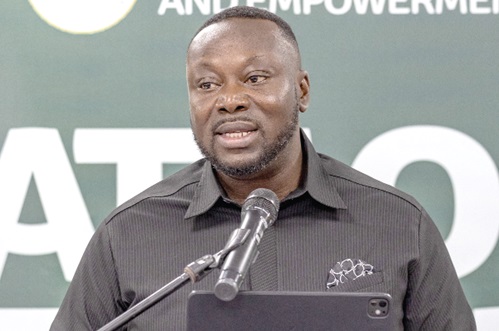The Minister of Youth Development and Empowerment, George Opare Addo, has outlined strategies to address the challenges of the youth in Ghana.
The strategies are hinged on five pillars - health and well-being, education and skills training, economic empowerment, civic engagement and community participation, and personal development and leadership.
Mr Opare Addo made this known when he presented the State of the Youth Address “SOYA 2025.” This was contained in statistics from a survey initiated by the ministry to produce data-based evidence of the challenges.
“As the minister responsible for youth development and empowerment, I am obliged to initiate a conversation about how our teeming youth are faring in this country.
“It is my considered view that this will enable us collectively to develop appropriate policy responses to inspire, equip and empower the youth of Ghana to unleash their potential for national development and global competitiveness,” he said.
Education
The minister said his outfit would engage relevant ministries and implementing agencies, including industry players, to standardise education curricula.
“We will also partner with the private sector, specifically the Association of Ghana Industries, the Ghana Employers’ Association, Private Enterprises Federation, and other stakeholders, to introduce structured workplace learning and graduate employment programmes.
“Policy initiatives will embed work-readiness, entrepreneurship, and digital skills across all educational tracks, enabling graduates to transition confidently into the labour market, adapt swiftly to new roles, and pursue entrepreneurship,” he added.
The minister expressed concern over the rising cases of mental disorders, drug abuse, obesity and teenage pregnancy among the youth.
He revealed that 41 per cent of tertiary and 37 per cent of SHS students had encountered drugs, while 26 per cent of first-time users were aged 14-15. Depression affected 8 per cent of tertiary students and 19 per cent of the general population, while 27.4 per cent of new HIV infections occurred among the youth.
Mr Addo emphasised promoting healthy lifestyles, tackling gaming and screen addictions, and improving access to counselling, as national priorities.
Unemployment
Mr Addo further said that youth unemployment rose from 16.9 per cent in 2017 to 22.5 per cent in 2022, while 70 per cent of jobless people were aged 15-35.
He also said that although secondary education and paid employment had improved, 60 per cent of youth remained in vulnerable work, while the informal sector share grew from 32 per cent in 2015 to 43 per cent in 2024.
The minister pledged coordinated reforms to connect education with jobs, promote entrepreneurship through NEIP, and support female and urban employment via targeted initiatives.
He said the 24-Hour Economy and expanded TVET pathways would drive continuous job creation and help end the NEET phenomenon through skills, innovation and formalisation.
Under civic engagement and community participation, less than 25 per cent of youth felt their voices influenced policy, while the rest believed they were ignored.
About 72 per cent of young citizens aged 18-35 had considered emigration for better prospects, underscoring the need to create opportunity and hope at home.
The minister further said that although youth formed 38 per cent of the population, only 10 per cent of assembly members were under 35.
He advised the youth to cultivate discipline, integrity and innovation to secure the nation’s future.

